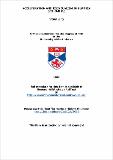Acculturation and bilingualism in Guambía (Colombia)
Abstract
The objective of
this study
is to trace the
relationship
between
oveit and covert acculturation and
bilingualism in the Colombian Indian community of
Guambia.
The first section
describes the ten indicators of
innovative behaviour that form the Overt Acculturation
Scale,
on
the basis
of which
the informants were allocated
to three Acculturation Categories. These indicators,
weighted according
to their
relative
importance for the
Guambianos, are:
dress
and
language;
occupation, migration
and education; reciprocal
labour,
goods and
the home,
ritual
and medicine, and access
to the media.
Acculturation has
noticeably affected very
few. These
form
an elite of well-educated young men who wear
Western
clothes,
have specialised occupations and skills, and are
well-acquainted with
White culture and society
through
personal
ties, migration and
the
media.
All
others are
distributed along a continuum,
taking
more or
less from the
White World.
Secondly, imaginative stories
told in Guambiano and
Spanish to
a series of pictures
by the informants
were
analysed
for
signs of covert acculturation.
Six hypotheses
were statistically
tested
which
held that the
ethnic
identity
of
the
characters portrayed, as
Guambiano
or
White, would
affect
their
personalities, actions, aims,
interactions
and emotions. Also, the
acculturational level
of
the
story-
teller
and
the language
used would affect the
content,
except
for
emotion.
In Guambiano
all
display similar beliefs in traditional
values and a similar
acculturated are
fav
achievement-oriented
show ambivalence and
people and culture.
Thirdly, these
ethnocentrism; in Spanish the highly
curable
to White
characters and more
and ambitious, the
slightly acculturated
the
unacculturated defend their
own
same stories were used
to investigate
bilingual
proficiency.
The
range of syntactic constructions
used
in the two languages, the
range of vocabulary
found in
Spanish,
and the levels
of grammatical and
lexical
interference in both languages
were used as measures of oral
productive proficiency.
The
majority shows sufficient
proficiency in Spanish for inter-group
communication,
but
some
few have
only a passive
knowledge
and others prove
more fluent than in Guambiano
on
the test.
The major conclusion
is that the Guambianos'
strong
ethnic identity
-
symbolised
in their dress, language, land
and work -
prevents greater acculturation. At
present only
the highly
acculturated elite
is innovative
and
bicultural,
while
the
majority seeks
to
maintain
its
cultural
heritage.
It is
economic interaction,
not
bilingualism, that
will
probably
lead to
eventual wholesale modification, since
the
Guambiano language
remains strong
but the
economic situation
grows ever worse.
Type
Thesis, PhD Doctor of Philosophy
Collections
Items in the St Andrews Research Repository are protected by copyright, with all rights reserved, unless otherwise indicated.

